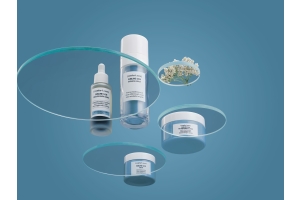Table of Contents
Most people have heard of retinol, but some may wonder ‘what is retinol?’. Retinol is a molecule derivative of vitamin A, often used in anti-aging products and as a treatment for various skin conditions. This enzyme is as powerful as it gets for reducing wrinkles and fine lines, making retinol serum one of the most effective anti-aging serums. As retinol helps neutralize free radicals and produce collagen, it has many other benefits for the skin and is an integral part of a comprehensive anti-aging skincare routine. If you are curious about how to use retinol serum and its benefits, this article is for you.
What Does Retinol Serum Do to Your Face?
What does retinol serum do exactly? The retinol molecule penetrates the skin to help neutralize free radicals and supports the production of collagen and elastin, which are responsible for giving the skin a younger appearance. This will help to reduce the appearance of fine lines, wrinkles, and enlarged pores.
Retinol is effective for treating acne by promoting cell turnover and reducing pore-clogging, which are common causes of breakouts. However, for more severe cases of acne, it's important to consult a doctor, as retinol is often used in conjunction with other prescribed medications to achieve the best results.
What Are the 3 Retinol Benefits?
You may ask, ‘what is retinol good for?’ The molecule is known to have 3 main benefits for the skin:
- Increases firmness and reduces wrinkles: Retinol promotes collagen production and skin cell turnover, helping to smooth fine lines and wrinkles and improve skin elasticity.
- Promotes a better skin texture: Retinol has exfoliating properties, which improve the skin tone and texture
- Reduces hyperpigmentation and dark spots: Retinol aids in fading dark spots by accelerating skin rejuvenation, which also treats hyperpigmentation by dispersing melanin clusters. This helps to even out skin tone more quickly, reducing the appearance of dark spots.
The combined effect of these 3 benefits means you will have smoother, clearer, healthier and younger-looking skin.
How Do You Know If Retinol Is Working?
How long does it take for retinol to work? Like many skincare products, it does take some time to see the effect of retinol on your skin. When retinol is used as an anti-aging product, most people see results after two to four months. Be sure you are using the right concentration of retinol. If you are new to retinol, start with a lower concentration and increase it as your skin gets used to the product. Be patient and you’ll enjoy the many retinol serum benefits. If you don’t notice an improvement after a few months, ask your dermatologist about a higher concentration.
You may see improvement earlier, especially if you are using retinol to treat acne or other skin problems. Sometimes, the skin may look worse at first before it gets better. This is known as the adjustment phase, and it is completely normal. However, if you notice that redness, flakiness or dryness isn’t getting better or is getting worse, ask your dermatologist. You may need a lower concentration of retinol or a different product.
A helpful tip is to take pictures of yourself along the way so you can see the improvement.
How To Use Retinol
Retinol is a potent ingredient, so following some basic guidelines is essential to ensure safe and effective use. It can be applied every day or even twice a day if your skin is already accustomed to the product. If you are just starting to use retinol, apply it every other day, so 3 times a week would be enough. However, after a few weeks, you can increase to using it once a day. The best retinol serum for you will depend on the other active ingredients you are using, your age and the retinol concentration.
Just like any serum, retinol should be used after cleanser but before moisturizer. Do not exfoliate before putting on retinol, as it could cause irritation. A pea-sized amount of product is enough to apply to your skin. Wait a few minutes for the product to penetrate your skin before applying a moisturizer.
Usually, retinol should only be used at night, as it could make you more sensitive to sunlight. There are, however, day creams containing some retinol as well. As there are many retinol products on the market, be sure to read the instructions and follow the advice of a health professional.
While retinol is not recommended for those with rosacea, eczema, pregnant women or those planning pregnancy, your dermatologist can help identify safe and effective alternatives tailored to your skin's unique needs.
Discover the transformative power of retinol and unlock the secret to a younger, more vibrant complexion. With the right product tailored to your skin type and needs, you're just steps away from revealing your skin's true potential.







Entrez l'adresse e-mail associée à votre compte BeautySense, et nous vous enverrons un lien pour réinitialiser votre mot de passe.